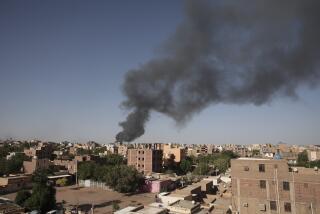NEWS ANALYSIS : Somalia No Easy Mission, Experts Warn
- Share via
WASHINGTON — Despite their broad support for an American military mission in Somalia, many U.S. foreign policy and military affairs experts caution that international intervention almost certainly will last longer and be more difficult than forecast in official estimates.
And despite the Bush Administration’s determination to commit U.S. troops only briefly and to strictly limit their mission, American leadership to galvanize international action on Somalia is also likely to saddle the United States with a longer-term role--even after withdrawal of its forces, the experts added.
“There are some dangers,” said Pauline Baker, a foreign policy specialist at the Aspen Institute in Washington. “The greatest vulnerability in Africa is that nothing works on time or according to plan. Everything always takes longer.”
Once in Somalia, experts said, the international community also will not be able to end its involvement until the broader political problems that brought on the crisis are addressed.
“You could have a narrow mission of establishing a zone for peace and distributing food,” Baker said. “But that would leave a political vacuum, and the warlords would just step in again as soon as you left. Then you’re back to square one, which is anarchy and chaos and stealing food.”
Unlike some previous peacekeeping missions, most notably the U.S.-led multinational force in Lebanon in 1982-84, American experts basically believe that the United States should follow through by helping to establish long-term stability after completing its military mission.
“You don’t start something you don’t want to finish,” said Chester Crocker, assistant secretary of state for African affairs in the Reagan Administration. “Part of the reason to get in is the emergency, but part is also to isolate the men with guns. And you don’t do that unless you think you can get a return to civil society.” The United States, he said, “has a responsibility to see it through.”
A longer-term role does not necessarily mean designing or imposing a political solution, but it may mean using leverage to bolster efforts of the United Nations or other mediators trying to solve the political problems, experts said.
The closest model for the immediate military mission, said several U.S. specialists, is Operation Provide Comfort in northern Iraq. In response to the plight of more than 1 million Kurdish refugees fleeing Iraqi President Saddam Hussein’s repression, 12,000 American troops were part of a 12-nation coalition deployed in Turkey and Iraq’s northern Kurdistan area for what was also supposed to be a brief humanitarian mission in April, 1991.
The U.S.-led allied troops provided food, shelter, medical care and security for the Kurds of northern Iraq. They also restored electrical power and other essential services.
American forces withdrew from Iraq after three months and were replaced by 500 U.N. guards assigned to monitor security of the 4 million Kurds living in the new safe-haven zone.
Yet 20 months later, Operation Provide Comfort is not over, nor is U.S. involvement. The coalition left behind a mobile strike force of more than 2,300 troops, including 1,500 Americans, at bases in Turkey. And American warplanes based in Turkey and the Persian Gulf regularly fly over Kurdistan to deter Iraqi military attacks against the Kurds.
In Somalia, U.S. military specialists foresee the mission in three basic stages. The first would be initial deployment and establishment of “a sense of order,” which could take only a couple of weeks.
The second stage would have two main goals: a military operation to disarm the militias and clan warlords and a humanitarian mission that would include setting up food stations, delivering relief supplies throughout the country and establishing social services now absent in the anarchic East African nation. This stage would probably take a minimum of three to four months.
The third, longest and most difficult stage will be the transition to some new form of lasting order, said Augustus Richard Norton, a former U.N. peacekeeper and a political science professor at West Point. After the devastating pattern of death and destruction has been stemmed, the international community will need to assemble a mechanism to govern or administer Somalia. “The United Nations will not be able to get out any time soon,” Norton added.
More to Read
Sign up for Essential California
The most important California stories and recommendations in your inbox every morning.
You may occasionally receive promotional content from the Los Angeles Times.













